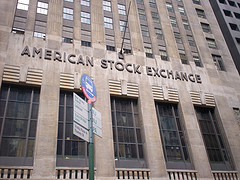I can’t really reword this one to sound any less (or more) incredible, so I’m gonna go straight to quotes:
The emotional roller coaster captured on Twitter can predict the ups and downs of the stock market, a new study finds. Measuring how calm the Twitterverse is on a given day can foretell the direction of changes to the Dow Jones Industrial Average three days later with an accuracy of 86.7 percent.
“We were pretty astonished that this actually worked,” said computational social scientist Johan Bollen of Indiana University-Bloomington.
You and me both, Johan, you and me both… but then, it’s a weird old interconnected world we live in, isn’t it?
“We’re using Twitter like a psychiatric patient,” Bollen said. “This allows us to measure the mood of the public over these six different mood states.”
As a sanity check, the researchers looked at the public mood on some easily-predictable days, like Election Day 2008 and Thanksgiving. The results were as expected: Twitter was anxious the day before the election, and much calmer, happier and kinder on Election Day itself, though all returned to normal by Nov. 5. On Thanksgiving, Twitter’s “Happy” score spiked.
Then, just to see what would happen, Mao compared the national mood to the Dow Jones Industrial Average. She found that one emotion, calmness, lined up surprisingly well with the rises and falls of the stock market — but three or four days in advance.
As daft as it sounds on the surface, this is probably pointing at some sort of core truth; it’s pretty much established that markets are emergent systems born of human interaction, so why shouldn’t you be able to get an idea of where things are going by finding a way to sample the mood of the planet?
That said, I’d very much like to know how wide-ranging the Twitter sampling was: did they use multiple languages, for instance, or just English? I suspect that Twitter’s demographic in geographical terms is still very white, Western, male and middle-class, too; would these results be strengthened by using more data from wider sources, or has a sort of accidental cherry-pick taken place? (White Western middle-class males are more likely to be stock owners or investors of one stripe or another, I’m guessing, so there’s probably some sort of inherent bias in using Twitter as a sample source.)
Even so, I’m fascinated by research that treats human civilisation as a system-of-systems with observable properties, and the rise of social networking is probably the catalyst for this growing field. Whether knowing how the system reacts and correlates will allow us to control it more effectively is another question entirely, of course… feedback is a powerful thing, but as any guitarist will tell you, it comes with risks. 😉
 Ars Technica has an interesting article about
Ars Technica has an interesting article about  Boy, those stock market trader guys sure can get the rest of us into a mess with their crazy high-jinks. But it’s not entirely their fault, you know – they just get a bit carried away in the heat of the moment. C’mon, we’ve all been there – emotions run high, you have to make a snap decision, and sometimes you get it wrong. Granted, for most of us there’s little chance of shafting the entire planet in the process…
Boy, those stock market trader guys sure can get the rest of us into a mess with their crazy high-jinks. But it’s not entirely their fault, you know – they just get a bit carried away in the heat of the moment. C’mon, we’ve all been there – emotions run high, you have to make a snap decision, and sometimes you get it wrong. Granted, for most of us there’s little chance of shafting the entire planet in the process…